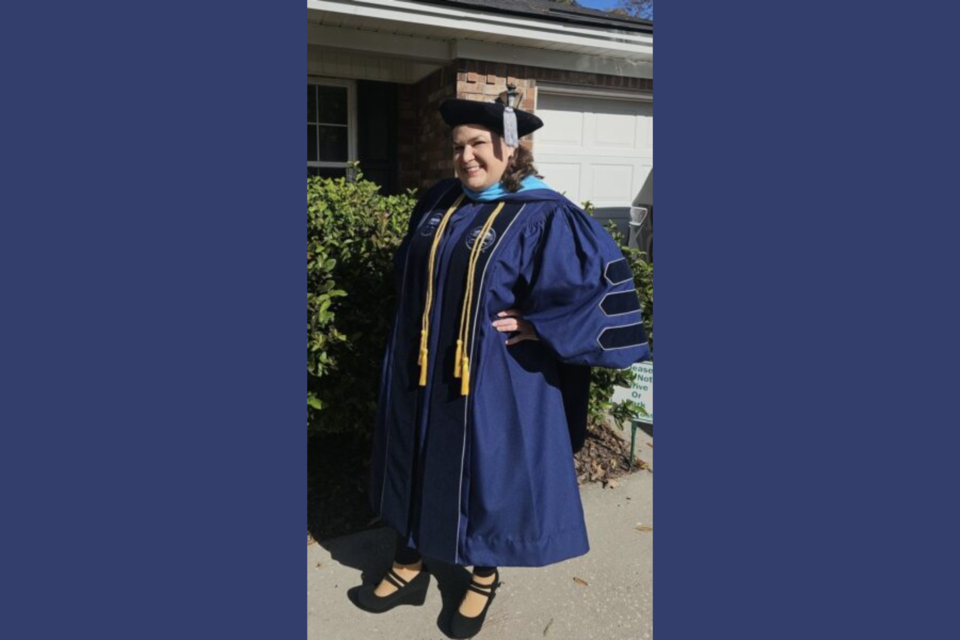Bonnie Ramos, Ed.D., assistant principal of Yokosuka Middle School in Japan, earned her doctoral cap and gown from Georgia Southern University in Statesboro this week.
Her five-year pursuit of a Doctor of Education in Curriculum Studies while teaching high school math and special education in the U.S. and Germany, fostering a child and relocating to Europe and then Asia was challenging. She said it was well worth it.
“I’d always wanted to pursue education,” Ramos said. “I love education. I love teaching. I love learning.”
Having specific goals in mind for her doctoral program, Ramos found alignment in Georgia Southern’s program when she began her studies in 2019. At the time, she was living in Augusta with her husband, Aaron, who was contracted there with the U.S. Government.
During this time, she and her husband also fostered a middle schooler for a year-and-a-half. As the child began showing signs of mental illness and was shuffled through four case managers who rarely consulted with them, the experience became increasingly distressful. However, that defining period, combined with her new studies, would put Ramos on a path to help others.
“It was a huge struggle,” said Ramos. “But I was able to recognize a whole bunch of issues, and then that’s how I realized that this is something I could write about for my dissertation.”
The hybrid curriculum studies format combines online courses with in-person meetings on select weekends. Once a month, Ramos and a small cohort in the same program would travel from Augusta to the Statesboro Campus together to meet with the Curriculum Studies professors, including Peggy Shannon-Baker, Ph.D., associate professor of Curriculum, Foundations and Reading in the College of Education.
Shannon-Baker encouraged Ramos to write about her lived experiences and what she gained from them. What emerged was an arts-based narrative analysis on the first-year, foster-parent experience and how to help foster care kids build resiliency. In a nod to her husband’s love of superheroes, the dissertation’s theoretical framework of trauma-informed care was supported with original comics, created from personal stories to showcase how foster children can build resiliency skills.
In spring 2022, Ramos accepted a Department of Defense Education Activity (DoDEA) position in Germany, teaching high school math on an Army base. Overwhelmed, she “had a hiccup” and thought she might not finish her doctoral degree.
“Dr. Shannon-Baker was like, ‘You already passed your candidacy,’” Ramos recalled. “You’ve already done three years. You’re not giving up. Even though you moved to Germany, you can’t quit.’
“I really wanted to quit. Dr. Shannon-Baker has been so instrumental in me finishing this program.”
Ramos stayed on task. As she inched closer to graduation, she discovered an opportunity to be assistant principal of Yokosuka Middle School, located on a Navy base 45 minutes south of Tokyo, Japan. Born in Honolulu, Hawaii, to a father in the Navy, the job felt like a natural fit as she missed the water and the familiarity of the maritime service branch.
She applied for the role and in August, she accepted the position that oversees one of the largest DoDEA schools in the Pacific with 840 children, while collecting and analyzing data to complete her dissertation and moving from Germany to Japan.
The week before Thanksgiving, Ramos passed her dissertation defense on a Zoom call with her committee. The meeting was an international affair, as her sister and brother-in-law in Dubai, teacher-friends from Germany, family in Texas, outside committee member Maria Lotty, Ph.D., from the University College Cork in Ireland., and the graduate writing group in Georgia joined her on the call.
In her new role, the dissertation has become more than a written body of work. It’s a platform from which she can reach the children she encounters with a grounded, holistic approach, recognizing that a child’s success is based on their whole well-being.
“Because of this dissertation I feel like I am making a greater impact,” Ramos said. “A huge part of an assistant principal’s job is discipline. When kids get in trouble, they come to the assistant principal. Because of the trauma-informed care background, I look at the whole child. What is in this child’s life that caused them to act out, to get in trouble?
“When I’m handing out discipline, I don’t just say, ‘You threw food in the cafeteria, here’s your detention.’ I mentor him, and I pull open his grades, and say, ‘Hey, what’s going on, buddy?’ With the military background, our kids’ parents are often deployed for six months at a time and they’re missing a mentor. They are struggling emotionally. So the resiliency skills that I researched with foster care kids directly correlates to the military child.”
Ramos feels that Georgia Southern’s program and mentorship has empowered her to lead with intention.
“I feel that Georgia Southern has allowed me to grow in my advocacy skills,” Ramos said. “It has given me an outlet for social justice. It has allowed me to make a greater impact in my circle of influence. It stretched my thinking. The first couple years of classes were huge when talking about being open-minded to other perspectives, and then diving deeper into foster care with the dissertation has allowed me to see things that I normally wouldn’t have seen as a middle-class student.”
Celebrating her achievements surrounded by more than 20 members of her family, the original curriculum studies Augusta cohort and other friends who traveled from around the country to be with her was so special.
“Core people who were instrumental in our fostering care journey, and the cohort, came down to support me,” said Ramos. “So it is huge. It’s a lovely thing that’s very full circle.”




